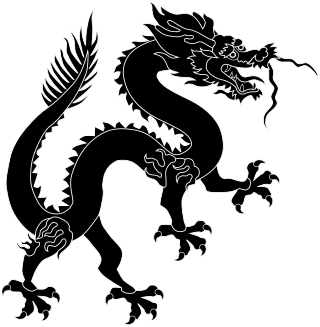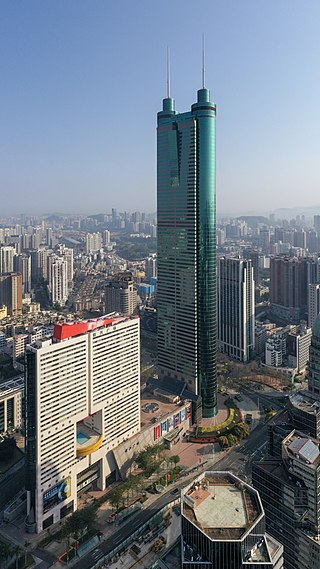| |||||
| Decades: | |||||
|---|---|---|---|---|---|
| See also: | Other events of 1822 History of China • Timeline • Years | ||||
Events from the year 1822 in China .
| |||||
| Decades: | |||||
|---|---|---|---|---|---|
| See also: | Other events of 1822 History of China • Timeline • Years | ||||
Events from the year 1822 in China .

The traditional Chinese calendar, dating back to the Han dynasty, is a lunisolar calendar that blends solar, lunar, and other cycles for social and agricultural purposes. While modern China primarily uses the Gregorian calendar for official purposes, the traditional calendar remains culturally significant. It determines the timing of Chinese New Year with traditions like the twelve animals of the Chinese Zodiac still widely observed.

The dragon is the fifth of the 12-year cycle of animals that appear in the Chinese zodiac related to the Chinese calendar. The Year of the Dragon is associated with the Earthly Branch symbol 辰.

The Dong River is the eastern tributary of the Pearl River in Guangdong province, southern China. The other two main tributaries of the Pearl River are the Xi River and the Bei River. The headwater is located in Mount Sanbai (三百山) in Anyuan County, Jiangxi.

Shun Hing Square, also known as "Di Wang Tower" (地王大厦) is a 384-meter (1,260 ft)-tall skyscraper in Shenzhen, Guangdong province, China. Upon its completion in 1996, it became the tallest building in China, until being surpassed by CITIC Plaza in the next year.

The Hong Kong national football team represents Hong Kong in international football and is controlled by the Football Association of Hong Kong, China, the governing body for football in Hong Kong.
A reunion dinner is held on Chinese New Year's Eve and Chinese New Year, during which family members get together to celebrate. It is often considered the most important get-together meal of the entire year.

American Methodist Episcopal Mission was the missionary society of the Methodist Episcopal Church that was involved in sending workers to countries such as Africa, South America, India, Australia and China during the late Qing dynasty.

Linzhi Milin Airport, also called Nyingchi Mainling Airport, is an airport in Mainling, Nyingchi, Tibet Autonomous Region, China. It is suggested to be one of the most challenging instrument approaches in the world, since the airport is in a winding valley.

Chinese New Year, or the Spring Festival, is a festival that celebrates the beginning of a new year on the traditional lunisolar Chinese calendar. Marking the end of winter and the beginning of spring, this festival takes place from Chinese New Year's Eve to the Lantern Festival, held on the 15th day of the year. The first day of Chinese New Year begins on the new moon that appears between 21 January and 20 February.
Ledong Li Autonomous County is an autonomous county in Hainan province, China. It is one of six autonomous counties of Hainan. Its postal code is 572500, and in 1999, its population was 468,834 people, largely made up of the Li people.

Chunli Li is a Chinese-born New Zealand female professional table tennis player. She won a gold, silver and two bronze medals at the 2002 Commonwealth Games to cap off her long career.

The Chinese zodiac is a traditional classification scheme based on the Chinese calendar that assigns an animal and its reputed attributes to each year in a repeating twelve-year cycle. The zodiac is very important in traditional Chinese culture and exists as a reflection of Chinese philosophy and culture. Chinese folkways held that one's personality is related to the attributes of their zodiac animal. Originating from China, the zodiac and its variations remain popular in many East Asian and Southeast Asian countries, such as Japan, South Korea, Vietnam, Singapore, Nepal, Bhutan, Cambodia, and Thailand.
Hong Kong University Press is the university press of the University of Hong Kong. It was established in 1956 and publishes more than 50 titles per year in both Chinese and English. Most works in English are on cultural studies, film and media studies, Chinese history and culture.
Death with reprieve is a criminal punishment found in chapter 5, sections 48, 50 and 51 of the criminal law of the People's Republic of China. It is a two-year suspended sentence where the execution is only carried out if the convicted commits further crimes during the suspension period. After the period the sentence is automatically reduced to life imprisonment, or to a fixed-term based on meritorious behavior. The reprieve is integrated into the sentence, unlike a pardon which occurs after the sentence.
Events from the year 1906 in China.
Choo Chiat Goh is a Chinese ballet dancer, choreographer, and the founder of the renowned Goh Ballet Academy, Canada, along with his wife Lin Yee.
Events in the year 1888 in China.

The China National Baseball League is a professional baseball league founded in 2019.

The COVID-19 pandemic, caused by severe acute respiratory syndrome coronavirus 2 (SARS-CoV-2), began with an outbreak of COVID-19 in Wuhan, China, in December 2019. Soon after, it spread to other areas of Asia, and then worldwide in early 2020. The World Health Organization (WHO) declared the outbreak a public health emergency of international concern (PHEIC) on 30 January 2020, and assessed the outbreak as having become a pandemic on 11 March.
The Wuhan Jinyintan Hospital is a public hospital located on Jinyintan Avenue in the Jiangjunlu Subdistrict, in the Dongxihu District of Wuhan, Hubei, China, and a unit directly under the Wuhan Municipal Health and Health Committee. Jinyintan Hospital specialises in infectious diseases. Jinyintan Hospital is one of the designated hospitals for emergency medical treatment in Hubei, including Wuhan. The hospital's president is Dr. Zhang Dingyu, a respiratory specialist. Its vice-director is Dr. Huang Chaolin.